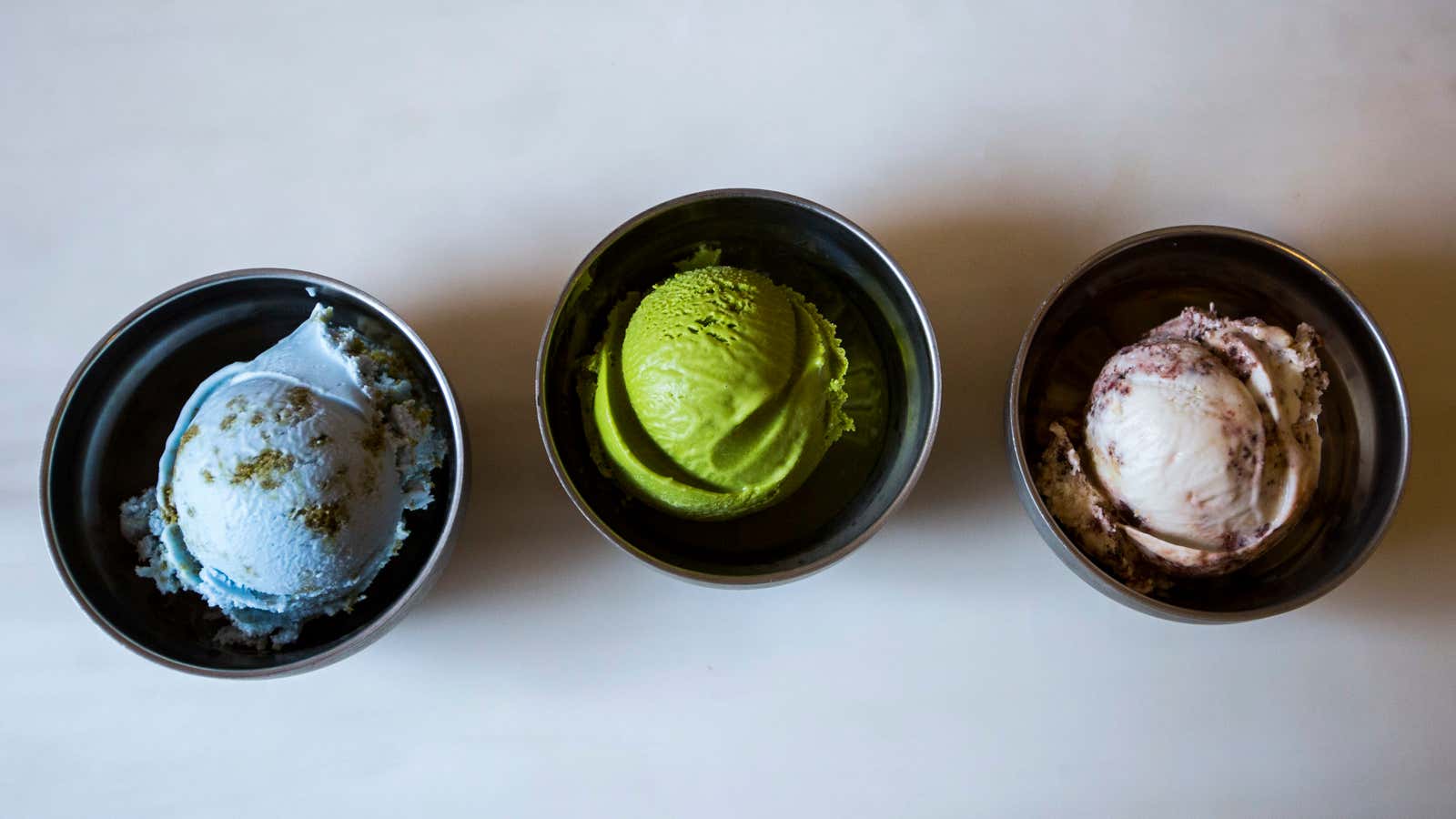Chocolate, vanilla, pistachio—there are many reasons to eat ice cream. Gut health is not one of them.
Culture Republick, a new brand of ice cream dreamed up by the food scientists and brand managers at the multination consumer-goods company Unilever, is lower in fat, sugar, and calories and higher in protein than regular ice cream, much like Halo Top. But wait, there’s more. Each pint of Culture Republick, in flavors like “Matcha & Fudge” and “Cold Brew & Chocolate Chip,” claims to contain 3 billion live cultures of a patented strain of a probiotic called GanedenBC30®.
On its website, Culture Republick explains that probiotics occur naturally in food like yogurt and kombucha. It doesn’t make any specific health claims, but it does say that “probiotics are typically considered the ‘good’ bacteria that help support the microbiome.” The message is clear: probiotics hang with the healthy crowd.
There’s some truth to this. The microbiome—the community of close to 40 trillion bacteria that exist in the typical human gut—has become a subject of intensive study in recent years, leading to findings suggesting it may have an effect on everything from the immune system to psychological health. Yale University just announced a new project exploring the connections between human social networks and the microbiomes of the people in those networks. These are legitimate questions and the microbiome may yet unlock a variety of new ways to improve our health.
The problem is, we don’t really understand the microbiome or the unique balance of the up to 1,000 different strains of bacteria that exist in each human. And, as of now, there’s very little evidence of any benefit to consuming probiotics if you’re already healthy.
That’s not to say probiotics are entirely useless. Some foods that have probiotic qualities appear to make us healthier, but we don’t know whether that’s the microbes, some symbiotic quality of microbes and nutrients, or just a lifestyle correlation.
Fermented and cultured foods, like kefir and sauerkraut, are rife with probiotics. These microbes give yogurt its tang and kimchi its funk, and the fermentation preserves vegetables and other items that might otherwise rot or spoil without refrigeration. It also seems to make certain foods more nutritious, as the authors of a 2016 study published in Current Opinion in Biotechnology note: “It is increasingly understood that some fermented foods also promote human health in ways not directly attributable to the starting food materials. That is, the outcomes of fermentation, and the contributions of microbes, in particular, can provide additional properties beyond basic nutrition.”
While there’s no definitive understanding of exactly how or why diets rich in yogurt or fermented vegetables support overall health, their friendly microbes seem to render certain nutrients in the food more easily digestible, making the actual cucumber, cabbage, or soybeans more nutritious.
The advantage may also be cultural, or the result of daily habits. In some food traditions, kimchi or yogurt are eaten regularly, which may establish an especially robust microbiome, one that could potentially be passed from mother to child during breastfeeding. This could be the result of ingesting healthy bacterias; but this effect could also just be correlation—that people who eat a lot of tempeh or sauerkraut tend to be healthier overall.
In any case, there does seem to be a more powerful gut-health benefit from regularly eating fermented foods, with their wide range of bacterias, than you could ever get from a single probiotic-infused bag of chips, or energy bar, or ice cream.
So there’s no strong reason to choose a probiotic ice cream over a regular scoop. Unless, of course, you just can’t get enough of Culture Republick’s more out-there flavors, like “Turmeric Chai & Cinnamon.”
